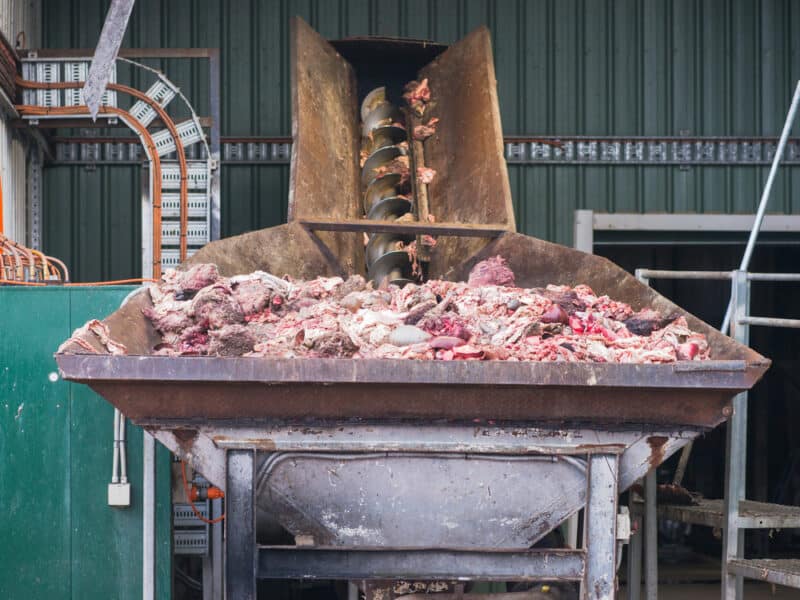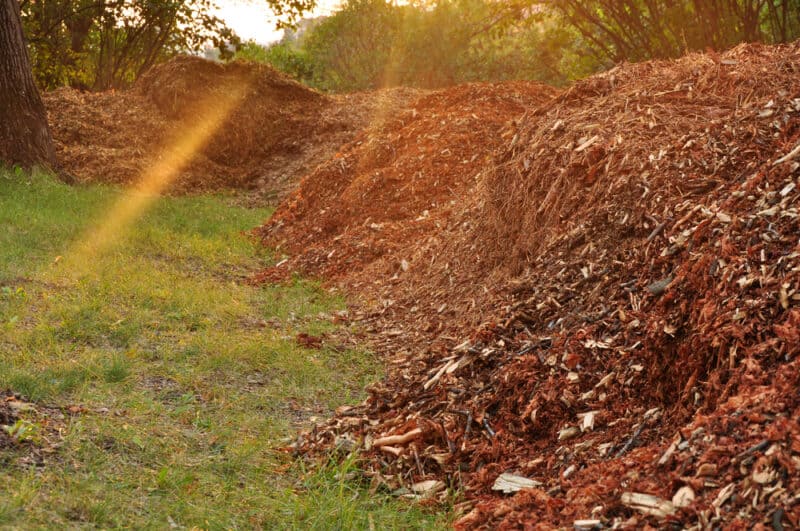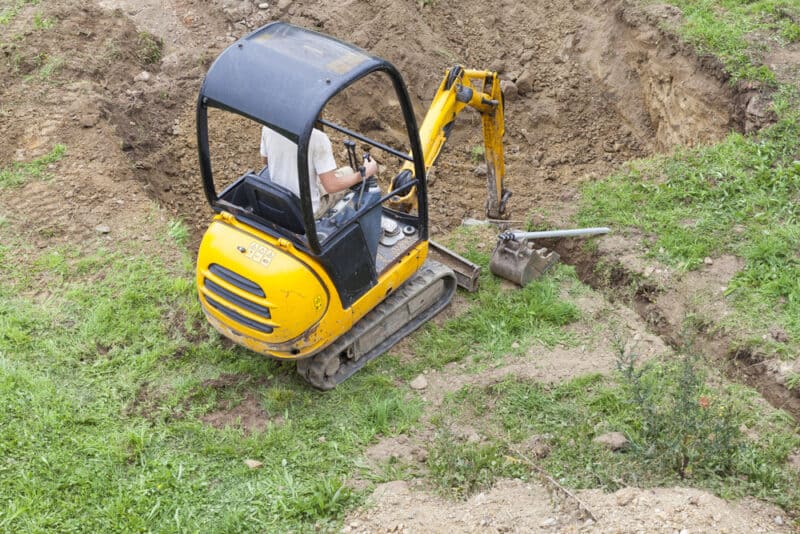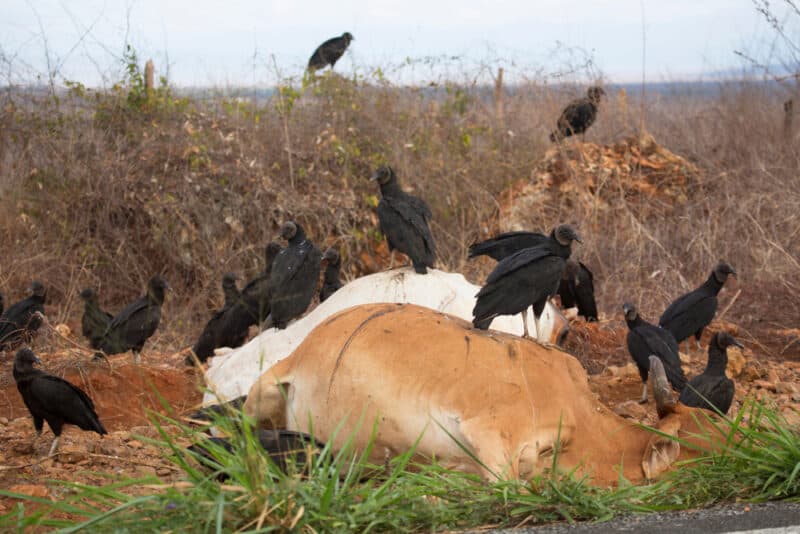What To Do When Your Animal Dies
My married man and I had ever talked about how sad we would exist when our favorite convenance sheep, Johanna and Thor, ultimately died of onetime age.
We never planned to ship these 2 to the butchery because they were docile, great breeders, and just all-effectually wonderful sheep to have on the farm.
We knew that the day would come when they would pass. Equally such, we had a loose plan of how nosotros would handle the disposal of our favorite farm animals if we found one of them dead in the pasture one day.
What we didn't expect was that we would take to deal with this result far sooner than we thought. However, it was not with those two detail individuals.
Terminal fall, one of our younger ewes savage on some ice and injured her leg.
After besides much time spent trying to get her up, trying to go her to consume, and giving her all the right medical attention, nosotros finally had to give up.
The problem and so arose of what we were supposed to practice with the body. Fortunately, this ewe was immature enough that processing her and eating the meat was an option. Had she been older or sick with some mysterious affliction, we wouldn't have felt comfy doing then.
While most people assume that farm animals can only be eaten when they die, that's non ever the example. Ofttimes, animals die unexpectedly and a farmer is left in a rather tricky situation. It can be quite difficult to effigy out what to exercise with a farm animal when information technology has passed on.
Here is some advice on the disposal of farm animals you lot can follow if you e'er find yourself in this situation.
Initial Steps to Take
If an beast dies unexpectedly on your farm, the first and single near of import matter you lot should do is to effigy out the cause of death.
In some cases, it might be obvious – we knew that our ewe had fallen and injured herself.
However, it is very mutual for animals to die in more mysterious ways – particularly sheep. Sheep are notorious for being seemingly healthy one mean solar day, then dead the next. Often, this is because of a disease or parasites.
Figuring out the cause of death is important because information technology will determine whether you tin can safely eat the meat. If you can, this will solve many of the problems related to getting rid of the body.
Whether an injury, or an brute making poor decisions similar getting its head stuck in a contend or feeder, you tin can commonly rule out the crusade of death pretty quickly.
However, if the cause of death is not known (possibly due to a transmissible disease), and so you'll need to take additional steps.
Information technology's a good idea to get in touch with a vet. This is doubly true if you suspect a disease or aren't sure what killed the animal. They tin practise testing to rule out various factors.
Not merely that, but figuring out the cause of decease is important when information technology comes to your remaining animals. If the animal died from a disease or heavy parasite loads, you'll need to medicate, deworm, and quarantine your herd. Being able to pinpoint exactly what killed your animal is vital.
Farm Animal Disposal

Once y'all know what killed your animate being, the next question is – what should yous practise with it?
You accept a few options.
i. Can Y'all Eat It?
Obviously, the least wasteful choice, if it is an option for yous, is to eat the animal that has died.
There are, nonetheless, many situations in which this is impractical. If your creature died from diseases or parasites, eating it is probably non a corking idea.
Besides, eating the fauna is actually only an option if you euthanized it. It might also work if you institute it pretty much immediately after it died.
It's non a adept thought to eat an animal that's been lying expressionless in the pasture for the final half-dozen hours.
Eating the animal is the best selection on this list in terms of reducing waste matter. Withal, information technology might not be the easiest to achieve when it comes to logistics.
2. Rendering
There are rendering plants all over the country that take in farm animal carcasses.
These plants reduce materials from slaughterhouses, meat packing castoffs, and farms. They process them downwardly into proteins, fats, and oils that are used in things like livestock feed, pet food, paints, and cosmetics.
If you accept a rendering plant near you, taking the carcass there is a great thought.
You volition take to pay to have the animal taken away but you can search online for facilities in your area.
3. Composting

Composting a dead farm animal is ane of the best solutions for dealing with the carcass. It also lets you make the virtually of the nutrients that are left behind.
Information technology doesn't take a lot of space, time, or effort, but you will demand to practise some thinking and planning ahead.
For the torso of a large farm animal to break down readily in a compost pile, that compost pile needs to be hot. There needs to be plenty of microbes there to break down the carcass for you.
Not simply that, but even in a very hot compost pile, you may demand to lay downward several inches of sawdust. This should be washed to a higher place and beneath the carcass to prevent it from developing a stench.
Yous'll demand a way to go the animal into the compost, too (like a loader).
If you simply throw the carcass on height of the compost pile, you're probably not going to like the results.
Nonetheless, if you're able to compost the trunk finer, yous'll be rewarded with nutrient-rich compost that can and then get back to the country. It's a win-win in that you'll be able to dispose of the body and get some bonus fertilizer, likewise.
four. Burial

Burying farm animals is another common option for disposal only again, it won't work for everyone.
Y'all volition demand to bury it in an appropriate location and at the proper depth so it won't contaminate the local water tabular array.
The issue with burying a carcass super deep is that it will be so far downwards in the ground that soil microbes won't be able to have advantage of it. It will lock up the nutrient potential of the carcass and not do your subcontract much good.
That said, if your but goal is to get rid of the carcass instead of making the all-time possible use of it, this shouldn't be an event.
The but other problem associated with burying a carcass is the time and labor involved. Unless you have a machine that'south going to practise a bulk of the hard digging for you, this is going to be challenging.
Earthworks a large and deep enough hole to bury a farm animal is going to crave a fair amount of backbreaking work.
That's specially true if you have stony soil!
5. Called-for
In some cases, you may be able to burn a carcass, but this isn't something I would recommend. The smell is going to exist less than desirable.
Also, most places have restrictions in place in terms of what you can burn. You too need to find out what you should exercise with the remaining pile of debris.
Ask your vet if she thinks this is a proficient idea.
You'll likewise demand to make sure your animate being didn't dice of something that could infect other animals, equally burning doesn't eliminate those risks.
Are There Any Other Options?

When it comes to the disposal of subcontract animals, the choices I've told you about higher up are probably your best bets.
However, there are plenty of other alternatives – some people go out expressionless subcontract animal carcasses to feed wildlife.
The big problem with this, of grade, is that y'all need a substantial corporeality of property and so you aren't inviting predators and pests right up shut to your home and subcontract.
Some people use expressionless carcasses to produce food for animals similar fish and chickens.
The most common method of doing this is suspending the carcass or part of the carcasses in the air with a mesh cage.
Chickens can peck at the carcass as information technology rots, and they'll besides be able to swallow maggots as flies lay their eggs there.
The nearly obvious issue with this is, well, it's kind of disgusting! Plus, if all the maggots aren't eaten, they'll turn into flies – that can create another problem for your farm entirely.
Yous tin even cutting up a carcass and feed the meat to your dog. If y'all've used whatever kind of medication, if the animal is diseased, or the carcass smells, then this isn't a skillful idea.
Ultimately, you have plenty of choices in how you lot decide to handle the disposal of a farm creature that died prematurely.
Consider the best option for you by weighing factors such as how the beast died, how long agone it died, and what kind of resource you accept at your disposal. Yous're sure to find the right solution in no time!
Was this article helpful?
Yes No
Source: https://morningchores.com/farm-animal-disposal/
Posted by: dickersonmigge1956.blogspot.com

0 Response to "What To Do When Your Animal Dies"
Post a Comment